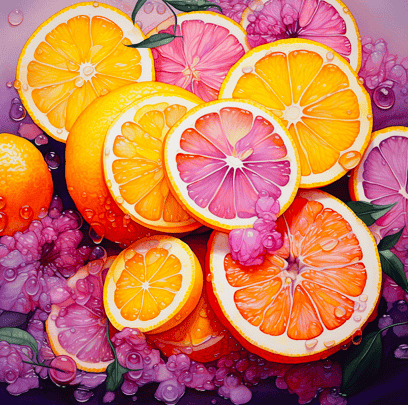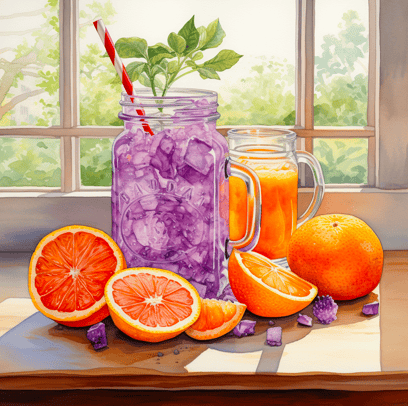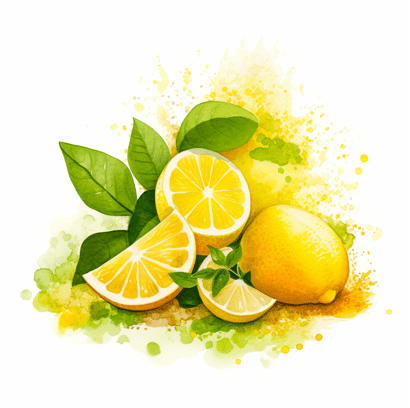
Choosing between orange vs lemon isn’t just about flavour—each has its own set of benefits that can significantly impact your daily wellness and beauty. Learn how each benefits you uniquely below.
Hi, I’m Hazel
I gave up on skincare after years of issues with acne and sensitive skin.
But after going plant-based, my skin cleared up and even started to glow. Now I help women reveal their natural beauty with simple, delicious plant-based food.
I also used to be a nurse, and love nerding out on nutritional science (high-quality science, that is).

As usual, this post is based on the strongest nutritional evidence I could find with a focus on the simplest, most delicious foods
…because who has time to waste on actions that don’t work?
The quick version:
Oranges and lemons offer unique health and beauty benefits: oranges are rich in Vitamin C and dietary fiber, aiding in skin health and blood sugar regulation, while lemons enhance collagen production and reduce dietary AGEs, supporting long-term wellness.
Nutritional Comparison
Oranges and lemons are both celebrated for their rich Vitamin C content, but when it comes to the nutritional punch or orange vs lemon, each helps with multiple health concerns and are a great way to support good health and energy levels.
Vitamin C: Oranges Lead the Charge

Oranges are a powerhouse when it comes to Vitamin C, essential for boosting the immune system and protecting against oxidative damage. This makes them a great choice for keeping your body’s defences strong.
Despite their renown for having high Vitamin C content, oranges also have Vitamin B (1).
Lemons’ Secret Weapons
Lemons may trail slightly behind oranges in Vitamin C content, but they make up for it with high levels of citric acid and essential minerals.
These components are crucial for energy production and overall cellular function, helping you maintain high energy levels throughout your busy day.
Oranges: A Sweet Source of Fibre
Oranges are not only delicious but also packed with dietary fibre which helps regulate blood sugar levels. The sugar content in oranges is balanced by this fibre, making them a smart choice for a balanced diet amidst the demands of busy lives.
Note: There are multiple types of oranges (e.g. navel oranges, cara cara oranges) and lemons (e.g. the common Lisbon lemon and less common Meyer lemon). These nutritional comparisons are an indicative comparison of the common varieties only.
Orange vs Lemon for Health and Beauty
Exploring how orange vs lemon supports cellular health and therefore beauty offers insights into how you can optimise your diet for better health and longevity.
Lifespan Extension with Oranges
Studies indicate that oranges help reduce DNA damage and may extend the lifespan of model organisms like C. elegans (2, 3).

Even incorporating orange juice into your diet could protect your cells and enhance your vitality, helping you maintain a youthful energy and appearance (4).
Go for blood orange or blood orange juice if you can, as the deeper the colour, the more antioxidants the orange has.
You may like:
How to Tell if a Blood Orange is Bad
Avoid Heart Disease
Orange juice can also improve multiple risk factors of cardiovascular disease, which helps you prevent heart disease. This included reducing bad cholesterol, however good cholesterol wasn’t mentioned in the review (5).
Lemons: Your Ally Against Ageing

Lemons have a powerful effect in reducing dietary Advanced Glycation End-products (AGEs), which accelerate the ageing process and contribute to chronic diseases such as diabetes and heart disease. By using lemon juice in your cooking, you can lower AGE formation by up to 15% (6).
Marinating your meat in lemon juice is an easy way to do the trick (7).
Lemons also have a unique ability to boost sulforaphane formation when added to cruciferous vegetables like shredded cabbage (8). This interaction enhances detoxification processes, further protecting against skin congestion, ageing and disease.
You may also like:
Does Detoxing Cause Acne? From Acne Woe to Glow
Oranges: Radiant Skin from Within
The antioxidant properties of oranges combat oxidative damage, one of the main culprits behind skin ageing.
Regular consumption of oranges may enhance skin health with improved texture, firmness, and overall radiance, giving you that sought-after natural glow.
Choosing orange juice can also be a strategic beauty move when dining out, especially to lessen UV damage linked to alcohol consumption, keeping your skin protected and radiant (9).
But as usual, the best way is to eat the whole fruit.
You’ll also love:
Eating More to Weigh Less: Fruity Freedom
Lemons: The Secret to Firm, Bright Skin
Rich in Vitamin C, lemons are essential in a diet for collagen production, which is crucial for keeping the skin tight and smooth.
Using lemon zest and lemon peel are additional ways to add zest, flavour and nutrition to your beauty food routine.
Culinary Creativity

Explore the vibrant and versatile ways to incorporate citrus peels such as orange peels and lemon rind into your meals and beverages, enhancing both taste and nutritional value.
Orange Peels
Orange peels bring a bright orange burst of flavour and a treasure trove of antioxidants to any dish.
From zesty salad toppings to flavour-packed baking ingredients, these peels can dramatically enhance both the visual appeal and health benefits of your meals.
Lemon Rind: A Tart Touch
The lemon rind adds a refreshing tart flavour that can elevate simple dishes to gourmet levels.
Incorporate it into salad dressings or use it to zest up your favourite citrus peels recipes like Blueberry muffins, adding not just flavour but also valuable nutrients that promote health.
Note on Meyer Lemons
Meyer lemons, with their distinct, sweetly-spiced flavour profile, offer a unique variation from the more common Lisbon lemons. They are are less acidic than traditional lemons, making them a gentler option for those sensitive to sharp citrus flavours. Their mild nature makes them perfect for desserts and dishes where a softer citrus touch is desired.
Orange vs Lemon
Navigating the choice between orange vs lemon isn’t just about picking a favourite fruit; it’s about understanding their distinct benefits and integrating them into your lifestyle for maximum health and beauty advantages. Whether boosting your Vitamin C intake with oranges or enhancing your meals and beauty routines with lemons, each fruit offers unique contributions that can cater to your wellness needs. And what’s the best thing about these citrus fruits? You can find them easily in the produce section of most grocery stores.
References
Most references below will link to the original peer-reviewed study itself. However, sometimes I will link to a video over at NutritionFacts.org instead, which is by far the single best resource of brutally transparent nutritional evidence you will ever see. Dr Greger tells a great story about the realities of the science and if I think you will benefit more from one of his videos, the link will take you there instead.
Happy nerding!
- Tütem, E., Sözgen Başkan, K., Karaman Ersoy, Ş., & Apak, R. (2020, January 1). Chapter 22 – Orange (A. K. Jaiswal, Ed.). ScienceDirect; Academic Press. https://www.sciencedirect.com/science/article/abs/pii/B9780128127803000222
- Guarnieri S, Riso P, Porrini M. Orange juice vs vitamin C: effect on hydrogen peroxide-induced DNA damage in mononuclear blood cells. Br J Nutr. 2007;97(4):639-643. doi:10.1017/S0007114507657948
- Wang J, Deng N, Wang H, et al. Effects of Orange Extracts on Longevity, Healthspan, and Stress Resistance in Caenorhabditis elegans. Molecules. 2020;25(2):351. Published 2020 Jan 15. doi:10.3390/molecules25020351
- Szeto YT, To TL, Pak SC, Kalle W. A study of DNA protective effect of orange juice supplementation. Appl Physiol Nutr Metab. 2013;38(5):533-536. doi:10.1139/apnm-2012-0344
- Alhabeeb H, Sohouli MH, Lari A, et al. Impact of orange juice consumption on cardiovascular disease risk factors: a systematic review and meta-analysis of randomized-controlled trials. Crit Rev Food Sci Nutr. 2022;62(12):3389-3402. doi:10.1080/10408398.2020.1865263
- Uribarri J, Woodruff S, Goodman S, et al. Advanced glycation end products in foods and a practical guide to their reduction in the diet. J Am Diet Assoc. 2010;110(6):911-16.e12. doi:10.1016/j.jada.2010.03.018
- Rungratanawanich W, Qu Y, Wang X, Essa MM, Song BJ. Advanced glycation end products (AGEs) and other adducts in aging-related diseases and alcohol-mediated tissue injury. Exp Mol Med. 2021;53(2):168-188. doi:10.1038/s12276-021-00561-7
- Hanschen FS. Domestic boiling and salad preparation habits affect glucosinolate degradation in red cabbage (Brassica oleracea var. capitata f. rubra). Food Chem. 2020;321:126694. doi:10.1016/j.foodchem.2020.126694
- Darvin ME, Sterry W, Lademann J, Patzelt A. Alcohol consumption decreases the protection efficiency of the antioxidant network and increases the risk of sunburn in human skin. Skin Pharmacol Physiol. 2013;26(1):45-51. doi:10.1159/000343908